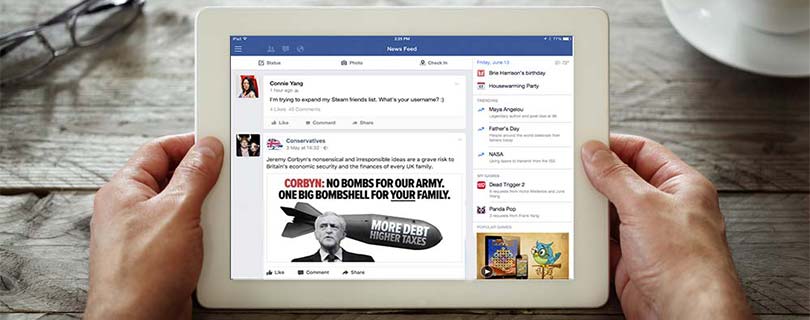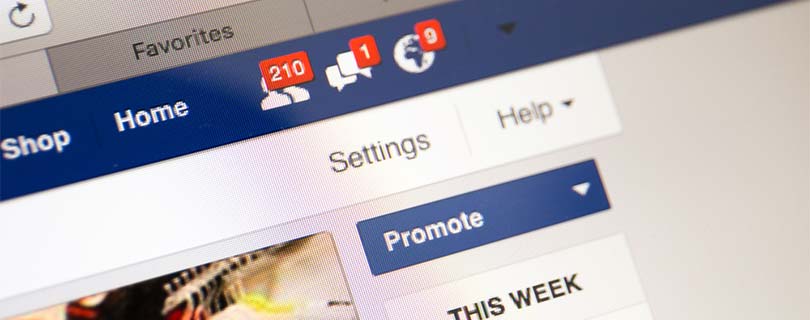Did Social Media ‘Dark Advertisements’ Influence The UK Election?

2017’s snap general election has been an interesting one to say the least, and at 21 Digital, we noticed a couple of new tactics emerge during it. One is the rise of what are being dubbed ‘attack ads’ or ‘dark advertisements’. As one of the more interesting – and controversial – social media tactics we’ve seen recently, they’re already drawing a lot of attention.
What Are ‘Dark’ Advertisements?

Essentially, dark advertisement is a term that’s being used to refer to certain political Facebook advertising. The ‘dark’ part of the name references the fact that it’s so difficult to monitor; the personal nature of the platform means that these Facebook advertisements are only ever seen by their intended audience.
Organisations like the BBC are trying to research into it, but they’re relying on respondents for their answers. They themselves admit that makes it tricky to draw objective conclusions.
Amongst the trends they’ve identified from these adverts:
- Instead of solely positive messages about their own party, they’re now increasingly sending out negative messages about other parties
- Many of these negative messages attack individuals personally, like Jeremy Corbyn and Theresa May
It goes beyond Facebook though. People are also seeing Conservative adverts on YouTube, as well as PPC adverts that pop up when users perform Google searches for other parties. For example, people have reported seeing Conservative adverts when they search the words ‘Liberal Democrats’.
It’s not just the Conservative party either; the Liberal Democrats, the Scottish National Party and Scottish Conservatives are all trying similar tactics. Labour, by contrast, often don’t mention even their own leader by name; a possible reflection of the slightly shaky public confidence in him.
How The Use Of Social Media Is Changing In Politics

Social media has always been a massively powerful force in politics. There are 32 million Facebook users in the UK alone, so any political party would be making a huge mistake not to take to social media. (It also makes it a massively valuable resource for business.)
But now, we’re starting to see it being used in a notably different way. Today, TV and radio segments can be quickly edited for tactical use in social media campaigns, with these edited clips often appearing on Facebook and Twitter feeds within hours of the original airing.
Case in point: after Jeremy Corbyn’s stumble over healthcare figures on Woman’s Hour last month, Facebook users were seeing an edited version of the clip on their Facebook feeds later that same day. These advertisements were sponsored by the Conservative party, and were targeted at Labour voters to try and change their minds about supporting Corbyn.
It’s exactly this kind of immediacy that’s bringing elements of the US ‘attack ad’ culture over to the UK.
It’s possible these tactics have been influenced by the American elections last year, too. Donald Trump famously used attack ads to put down Hillary Clinton, not only addressing her policies but also asserting statements about her character and personal life. It’s not clear exactly to what extent these influenced the results, but there’s no denying they definitely played a part.
Now, it looks like similar strategies might be starting to see widespread use in UK politics, and not everyone’s happy about it.
The Concerns About Dark Advertisements
UK project Who Targets Me reveals Facebook “dark ads” on the rise before election https://t.co/PUKMAQlZZW https://t.co/R1eP6t5zF5
— Mediagazer (@mediagazer) June 7, 2017
Even as a tactic that’s still in relative infancy, ‘dark’ social media advertisements already have strong critics. It’s not helped by the fact that the Conservatives, for example, refuse to disclose the full details of their advertisements, how they target their audiences, or even who those audiences are.
The main thrust of the arguments against dark advertisements concerns their secretive nature. Because they’re not openly visible, their claims can’t always be effectively challenged. which gives parties greater freedom to present their subjective views as objective ‘truth’ to social media users. They’re not just marketing themselves, but they’re putting forward ‘facts’ about others, which as you can imagine makes it all very questionable (legally speaking).
So What’s Next?
With the general election over, it remains to be seen what sort of regulation will be brought in to tackle dark advertisements.
The UK Information Commissioner’s Office has already launched an investigation into how political parties access their voters’ personal information online, which will no doubt take dark advertisements on social media into account at some point. What the ICO will propose to do about it, though, is another matter entirely!
What We Think At 21 Digital
We’re in two minds here at 21 Digital. On the one hand, it’s an undeniably canny use of social media. First, political social media campaigns used Facebook’s cutting-edge demographics targeting to identify key characteristics among voters (which, incidentally, is the basis for all amazing social media strategies).
They then used this information to target those in ‘marginal constituencies’; in other words, voters most liable to switch loyalties. With such closely-tied campaigns, these voters were potentially critical to winning the election. Most target audiences, though, didn’t approve of the most aggressive claims – especially as many of them were so transparently subjective.
Personally, we think it’s fascinating to see how the use of social media is evolving in politics. Having said that, we’re definitely in favour of tighter regulation for dark advertisements themselves, just as rules are applied to other forms of media.
If nothing else, the rise of attack ads and dark advertisements are just another testament to the staggering power of social media. If the leadership of our country is using it to communicate with their audiences, why shouldn’t you?
But – and we stress this – you don’t need to attack your competition to achieve success on social media. In fact, it’s far more effective if you don’t! At 21 Digital, our experts can help you connect with your customers in a transparent, trustworthy way, helping public perception of your business and boosting your bottom line.
To find out how, give us a call on 01254 660 560, or email us at hello@21digital.agency. Let’s talk.
Don’t forget to follow us on Twitter: @21Digital_Ltd










